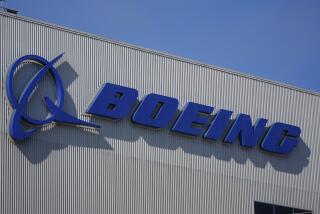UAW-Chrysler Accord Follows Industry Trend : Labor: The tentative pact is one the auto maker had said it couldnât afford. But both sides say they will benefit from the contract.
HIGHLAND PARK, Mich. â The United Auto Workers and Chrysler Corp. reached a tentative agreement Tuesday on a three-year contract, matching an industry pattern that the company repeatedly had said it couldnât afford.
âItâs a pattern settlement and a pattern settlement in all respects,â UAW President Owen Bieber said.
He was referring to a union goal set in mid-July of similar contracts for the 450,000 UAW workers at General Motors Corp., Ford Motor Co. and Chrysler.
Chrysler didnât give away the store, however, its chief negotiator, Anthony St. John, said. âThere are elements in this agreement that are particularly helpful to Chryslerâs case,â said St. John, a Chrysler vice president.
The agreement covers 63,000 workers in Michigan, Missouri, Delaware, Alabama, Illinois, Indiana, New York and Ohio.
Details were not released, but Chrysler appeared to have secured a new production plan at its minivan plant in St. Louis.
A year ago, members of Local 110, covering about 3,500 workers at the St. Louis factory, rejected a proposal to change from two straight shifts to three crews on two shifts. The company said that would boost minivan production by 20% and employment by 1,000 to 1,300 jobs.
Although the UAWâs national leadership and the company had backed the change, plant workers contended that it denied them any chance at overtime.
The contract will be reviewed by the 200-member Chrysler bargaining council in Detroit before going to the rank and file for ratification.
St. John said there would be no change in the unionâs â30 and outâ retirement plan, which allows workers to retire when they have 30 years of seniority, no matter how old they are.
The company had proposed holding off pension payments until a worker reached 60.
Bieber and St. John declined to answer questions about health-care provisions, a sticking point in the talks. In the GM-Ford agreements, there was no change in method of coverage, but the companies and the union agreed to look for ways to cut costs.
Chrysler said it spent $684 million on health care last year. A companyâs health-care bill is increased by a higher percentage of retirees, and Chrysler has nearly one retiree for every active worker--a higher proportion than GM or Ford.
The UAW reached agreement with GM on Sept. 17. After that contract was ratified, it took just six days for the union and Ford to agree.
The union terminated an extension of its Chrysler contract at midnight Monday but told members to report to their jobs as usual Tuesday while bargaining continued.






